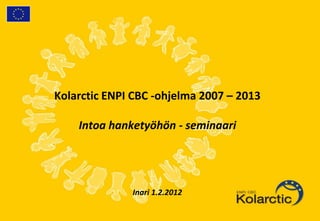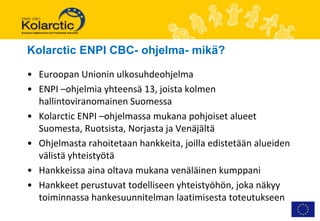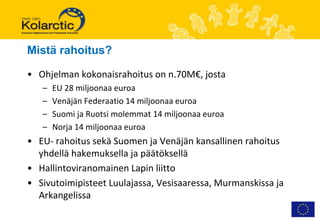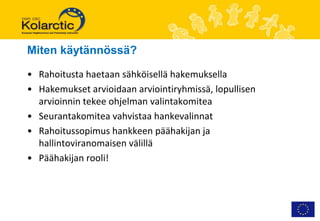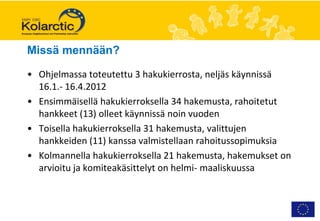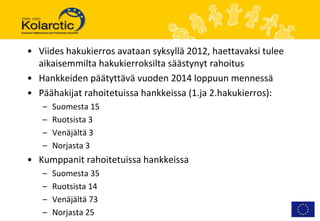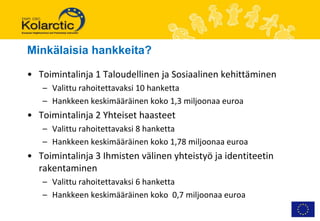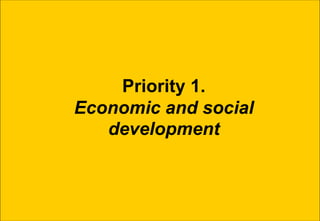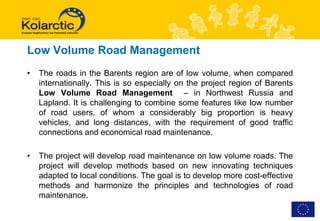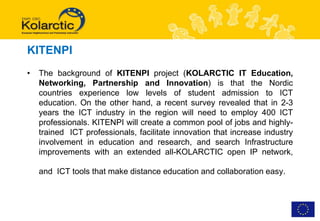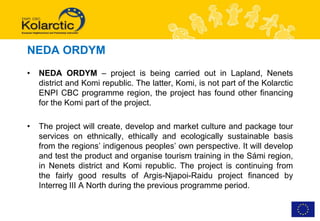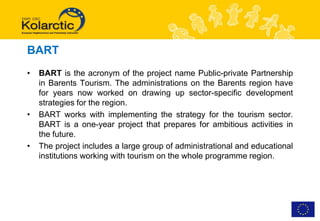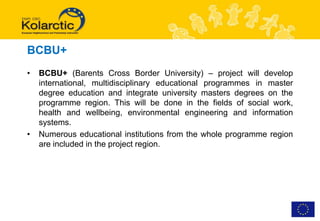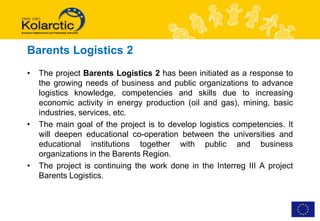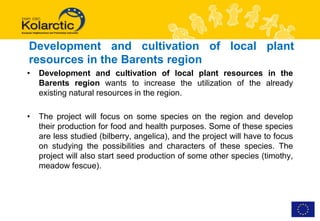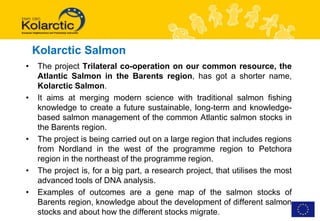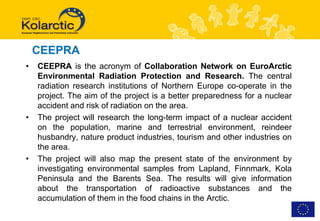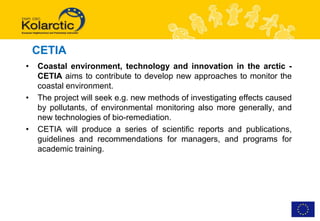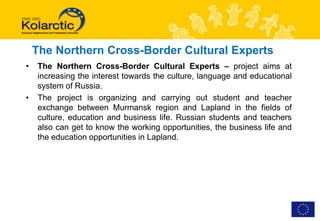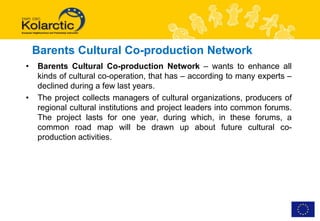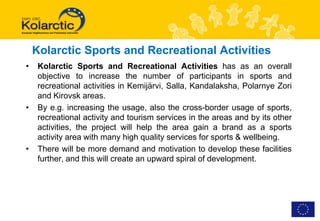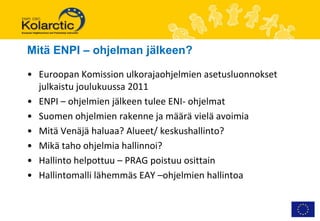3 ekdahl inari 1.2.2012
- 1. Kolarctic ENPI CBC -ohjelma 2007 – 2013 Intoa hanketyöhön - seminaari Inari 1.2.2012
- 2. Kolarctic ENPI CBC- ohjelma- mikä? • Euroopan Unionin ulkosuhdeohjelma • ENPI –ohjelmia yhteensä 13, joista kolmen hallintoviranomainen Suomessa • Kolarctic ENPI –ohjelmassa mukana pohjoiset alueet Suomesta, Ruotsista, Norjasta ja Venäjältä • Ohjelmasta rahoitetaan hankkeita, joilla edistetään alueiden välistä yhteistyötä • Hankkeissa aina oltava mukana venäläinen kumppani • Hankkeet perustuvat todelliseen yhteistyöhön, joka näkyy toiminnassa hankesuunnitelman laatimisesta toteutukseen
- 3. Mistä rahoitus? • Ohjelman kokonaisrahoitus on n.70M€, josta – EU 28 miljoonaa euroa – Venäjän Federaatio 14 miljoonaa euroa – Suomi ja Ruotsi molemmat 14 miljoonaa euroa – Norja 14 miljoonaa euroa • EU- rahoitus sekä Suomen ja Venäjän kansallinen rahoitus yhdellä hakemuksella ja päätöksellä • Hallintoviranomainen Lapin liitto • Sivutoimipisteet Luulajassa, Vesisaaressa, Murmanskissa ja Arkangelissa
- 4. Miten käytännössä? • Rahoitusta haetaan sähköisellä hakemuksella • Hakemukset arvioidaan arviointiryhmissä, lopullisen arvioinnin tekee ohjelman valintakomitea • Seurantakomitea vahvistaa hankevalinnat • Rahoitussopimus hankkeen päähakijan ja hallintoviranomaisen välillä • Päähakijan rooli!
- 5. Missä mennään? • Ohjelmassa toteutettu 3 hakukierrosta, neljäs käynnissä 16.1.- 16.4.2012 • Ensimmäisellä hakukierroksella 34 hakemusta, rahoitetut hankkeet (13) olleet käynnissä noin vuoden • Toisella hakukierroksella 31 hakemusta, valittujen hankkeiden (11) kanssa valmistellaan rahoitussopimuksia • Kolmannella hakukierroksella 21 hakemusta, hakemukset on arvioitu ja komiteakäsittelyt on helmi- maaliskuussa
- 6. • Viides hakukierros avataan syksyllä 2012, haettavaksi tulee aikaisemmilta hakukierroksilta säästynyt rahoitus • Hankkeiden päätyttävä vuoden 2014 loppuun mennessä • Päähakijat rahoitetuissa hankkeissa (1.ja 2.hakukierros): – Suomesta 15 – Ruotsista 3 – Venäjältä 3 – Norjasta 3 • Kumppanit rahoitetuissa hankkeissa – Suomesta 35 – Ruotsista 14 – Venäjältä 73 – Norjasta 25
- 7. Minkälaisia hankkeita? • Toimintalinja 1 Taloudellinen ja Sosiaalinen kehittäminen – Valittu rahoitettavaksi 10 hanketta – Hankkeen keskimääräinen koko 1,3 miljoonaa euroa • Toimintalinja 2 Yhteiset haasteet – Valittu rahoitettavaksi 8 hanketta – Hankkeen keskimääräinen koko 1,78 miljoonaa euroa • Toimintalinja 3 Ihmisten välinen yhteistyö ja identiteetin rakentaminen – Valittu rahoitettavaksi 6 hanketta – Hankkeen keskimääräinen koko 0,7 miljoonaa euroa
- 8. Priority 1. Economic and social development
- 9. Low Volume Road Management • The roads in the Barents region are of low volume, when compared internationally. This is so especially on the project region of Barents Low Volume Road Management – in Northwest Russia and Lapland. It is challenging to combine some features like low number of road users, of whom a considerably big proportion is heavy vehicles, and long distances, with the requirement of good traffic connections and economical road maintenance. • The project will develop road maintenance on low volume roads. The project will develop methods based on new innovating techniques adapted to local conditions. The goal is to develop more cost-effective methods and harmonize the principles and technologies of road maintenance.
- 10. KITENPI • The background of KITENPI project (KOLARCTIC IT Education, Networking, Partnership and Innovation) is that the Nordic countries experience low levels of student admission to ICT education. On the other hand, a recent survey revealed that in 2-3 years the ICT industry in the region will need to employ 400 ICT professionals. KITENPI will create a common pool of jobs and highly- trained ICT professionals, facilitate innovation that increase industry involvement in education and research, and search Infrastructure improvements with an extended all-KOLARCTIC open IP network, and ICT tools that make distance education and collaboration easy.
- 11. NEDA ORDYM • NEDA ORDYM – project is being carried out in Lapland, Nenets district and Komi republic. The latter, Komi, is not part of the Kolarctic ENPI CBC programme region, the project has found other financing for the Komi part of the project. • The project will create, develop and market culture and package tour services on ethnically, ethically and ecologically sustainable basis from the regions’ indigenous peoples’ own perspective. It will develop and test the product and organise tourism training in the Sámi region, in Nenets district and Komi republic. The project is continuing from the fairly good results of Argis-Njapoi-Raidu project financed by Interreg III A North during the previous programme period.
- 12. BART • BART is the acronym of the project name Public-private Partnership in Barents Tourism. The administrations on the Barents region have for years now worked on drawing up sector-specific development strategies for the region. • BART works with implementing the strategy for the tourism sector. BART is a one-year project that prepares for ambitious activities in the future. • The project includes a large group of administrational and educational institutions working with tourism on the whole programme region.
- 13. BCBU+ • BCBU+ (Barents Cross Border University) – project will develop international, multidisciplinary educational programmes in master degree education and integrate university masters degrees on the programme region. This will be done in the fields of social work, health and wellbeing, environmental engineering and information systems. • Numerous educational institutions from the whole programme region are included in the project region.
- 14. Barents Logistics 2 • The project Barents Logistics 2 has been initiated as a response to the growing needs of business and public organizations to advance logistics knowledge, competencies and skills due to increasing economic activity in energy production (oil and gas), mining, basic industries, services, etc. • The main goal of the project is to develop logistics competencies. It will deepen educational co-operation between the universities and educational institutions together with public and business organizations in the Barents Region. • The project is continuing the work done in the Interreg III A project Barents Logistics.
- 15. Development and cultivation of local plant resources in the Barents region • Development and cultivation of local plant resources in the Barents region wants to increase the utilization of the already existing natural resources in the region. • The project will focus on some species on the region and develop their production for food and health purposes. Some of these species are less studied (bilberry, angelica), and the project will have to focus on studying the possibilities and characters of these species. The project will also start seed production of some other species (timothy, meadow fescue).
- 17. Kolarctic Salmon • The project Trilateral co-operation on our common resource, the Atlantic Salmon in the Barents region, has got a shorter name, Kolarctic Salmon. • It aims at merging modern science with traditional salmon fishing knowledge to create a future sustainable, long-term and knowledge- based salmon management of the common Atlantic salmon stocks in the Barents region. • The project is being carried out on a large region that includes regions from Nordland in the west of the programme region to Petchora region in the northeast of the programme region. • The project is, for a big part, a research project, that utilises the most advanced tools of DNA analysis. • Examples of outcomes are a gene map of the salmon stocks of Barents region, knowledge about the development of different salmon stocks and about how the different stocks migrate.
- 18. CEEPRA • CEEPRA is the acronym of Collaboration Network on EuroArctic Environmental Radiation Protection and Research. The central radiation research institutions of Northern Europe co-operate in the project. The aim of the project is a better preparedness for a nuclear accident and risk of radiation on the area. • The project will research the long-term impact of a nuclear accident on the population, marine and terrestrial environment, reindeer husbandry, nature product industries, tourism and other industries on the area. • The project will also map the present state of the environment by investigating environmental samples from Lapland, Finnmark, Kola Peninsula and the Barents Sea. The results will give information about the transportation of radioactive substances and the accumulation of them in the food chains in the Arctic.
- 19. CETIA • Coastal environment, technology and innovation in the arctic - CETIA aims to contribute to develop new approaches to monitor the coastal environment. • The project will seek e.g. new methods of investigating effects caused by pollutants, of environmental monitoring also more generally, and new technologies of bio-remediation. • CETIA will produce a series of scientific reports and publications, guidelines and recommendations for managers, and programs for academic training.
- 20. Priority 3. People to people cooperation and identity building
- 21. The Northern Cross-Border Cultural Experts • The Northern Cross-Border Cultural Experts – project aims at increasing the interest towards the culture, language and educational system of Russia. • The project is organizing and carrying out student and teacher exchange between Murmansk region and Lapland in the fields of culture, education and business life. Russian students and teachers also can get to know the working opportunities, the business life and the education opportunities in Lapland.
- 22. Barents Cultural Co-production Network • Barents Cultural Co-production Network – wants to enhance all kinds of cultural co-operation, that has – according to many experts – declined during a few last years. • The project collects managers of cultural organizations, producers of regional cultural institutions and project leaders into common forums. The project lasts for one year, during which, in these forums, a common road map will be drawn up about future cultural co- production activities.
- 23. Kolarctic Sports and Recreational Activities • Kolarctic Sports and Recreational Activities has as an overall objective to increase the number of participants in sports and recreational activities in Kemijärvi, Salla, Kandalaksha, Polarnye Zori and Kirovsk areas. • By e.g. increasing the usage, also the cross-border usage of sports, recreational activity and tourism services in the areas and by its other activities, the project will help the area gain a brand as a sports activity area with many high quality services for sports & wellbeing. • There will be more demand and motivation to develop these facilities further, and this will create an upward spiral of development.
- 24. Mitä ENPI – ohjelman jälkeen? • Euroopan Komission ulkorajaohjelmien asetusluonnokset julkaistu joulukuussa 2011 • ENPI – ohjelmien jälkeen tulee ENI- ohjelmat • Suomen ohjelmien rakenne ja määrä vielä avoimia • Mitä Venäjä haluaa? Alueet/ keskushallinto? • Mikä taho ohjelmia hallinnoi? • Hallinto helpottuu – PRAG poistuu osittain • Hallintomalli lähemmäs EAY –ohjelmien hallintoa

